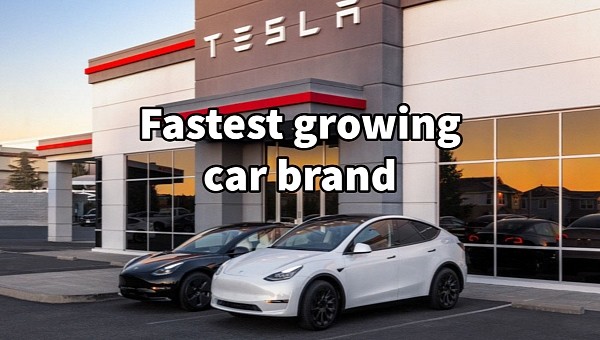Tesla is on track for a record quarter, surpassing many legacy carmakers in the U.S., as a Cox Automotive report revealed. Tesla’s results show that the EV maker is gaining market share in the U.S. faster than any other carmaker. Tesla has already surpassed Volkswagen Group in this regard and is threatening Honda’s position.
Many people believed that Tesla’s market share would be eaten by legacy carmakers as soon as they seriously considered selling electric vehicles. This prediction proved wrong, as traditional carmakers struggle with production and supply chain problems. Failing to ramp up EV production, they are losing a lot of money on their EV business, as Ford recently revealed. Sure, they started selling electric vehicles, which somehow diminished Tesla’s piece of the pie in the EV market. But they are losing market share to Tesla in the broader car market.
A recent report confirms this trend. It will only accelerate as Tesla expands its production capacity with new gigafactories. According to new data compiled by Cox Automotive, Tesla is set to become the fastest-growing automaker in the U.S. in Q1 2023, overtaking many legacy car manufacturers. The EV maker has sold 40% more EVs compared to Q1 2022 and 38% more than in Q4 2022. Tesla now controls more than 5% of the overall car market for the first time, a huge gain over the last year’s average of 3.8% market share. This is more than the Volkswagen Group, Subaru, Mazda, BMW, and Daimler.
Many legacy carmakers saw their sales slowing down in Q1 2023, suggesting a lost momentum in the market. Toyota and Hyundai are the most affected. Meanwhile, the Japanese brand is also losing the most market share (from 15.2% in 2022 to 13.2 in Q1 2023). This is telling for the Japanese brand, which is still reluctant to embrace electric vehicles. According to a recent study, Toyota and Honda’s customers are the most likely to defect to Tesla because they want to buy an EV.
Cox Automotive shows that General Motors and Ford held their market share in the first quarter (+0.4% and +0.2%, respectively). Their sales in the quarter slipped compared to Q3 2022. But they’re still on track for good results compared to Q1 2022 (+15.3% and +11.3%, respectively). Stellantis, on the other hand, is expected to report sales down 11.3% compared to Q1 last year, dropping from 11.1% market share in 2022 to 10.2 this quarter.
Surprisingly, Rivian and Lucid have the biggest sales growth compared to 2022, although their numbers are very small. Rivian sales grew 564%, and Lucid, 192% versus Q1 2022, when they sold 1,227 and 460 vehicles. On the other hand, Tesla is expected to report sales of 181,000 EVs in Q1, making it likely to reach one million vehicles sold in the U.S. by the end of the year.
A recent report confirms this trend. It will only accelerate as Tesla expands its production capacity with new gigafactories. According to new data compiled by Cox Automotive, Tesla is set to become the fastest-growing automaker in the U.S. in Q1 2023, overtaking many legacy car manufacturers. The EV maker has sold 40% more EVs compared to Q1 2022 and 38% more than in Q4 2022. Tesla now controls more than 5% of the overall car market for the first time, a huge gain over the last year’s average of 3.8% market share. This is more than the Volkswagen Group, Subaru, Mazda, BMW, and Daimler.
Many legacy carmakers saw their sales slowing down in Q1 2023, suggesting a lost momentum in the market. Toyota and Hyundai are the most affected. Meanwhile, the Japanese brand is also losing the most market share (from 15.2% in 2022 to 13.2 in Q1 2023). This is telling for the Japanese brand, which is still reluctant to embrace electric vehicles. According to a recent study, Toyota and Honda’s customers are the most likely to defect to Tesla because they want to buy an EV.
Cox Automotive shows that General Motors and Ford held their market share in the first quarter (+0.4% and +0.2%, respectively). Their sales in the quarter slipped compared to Q3 2022. But they’re still on track for good results compared to Q1 2022 (+15.3% and +11.3%, respectively). Stellantis, on the other hand, is expected to report sales down 11.3% compared to Q1 last year, dropping from 11.1% market share in 2022 to 10.2 this quarter.
Surprisingly, Rivian and Lucid have the biggest sales growth compared to 2022, although their numbers are very small. Rivian sales grew 564%, and Lucid, 192% versus Q1 2022, when they sold 1,227 and 460 vehicles. On the other hand, Tesla is expected to report sales of 181,000 EVs in Q1, making it likely to reach one million vehicles sold in the U.S. by the end of the year.







